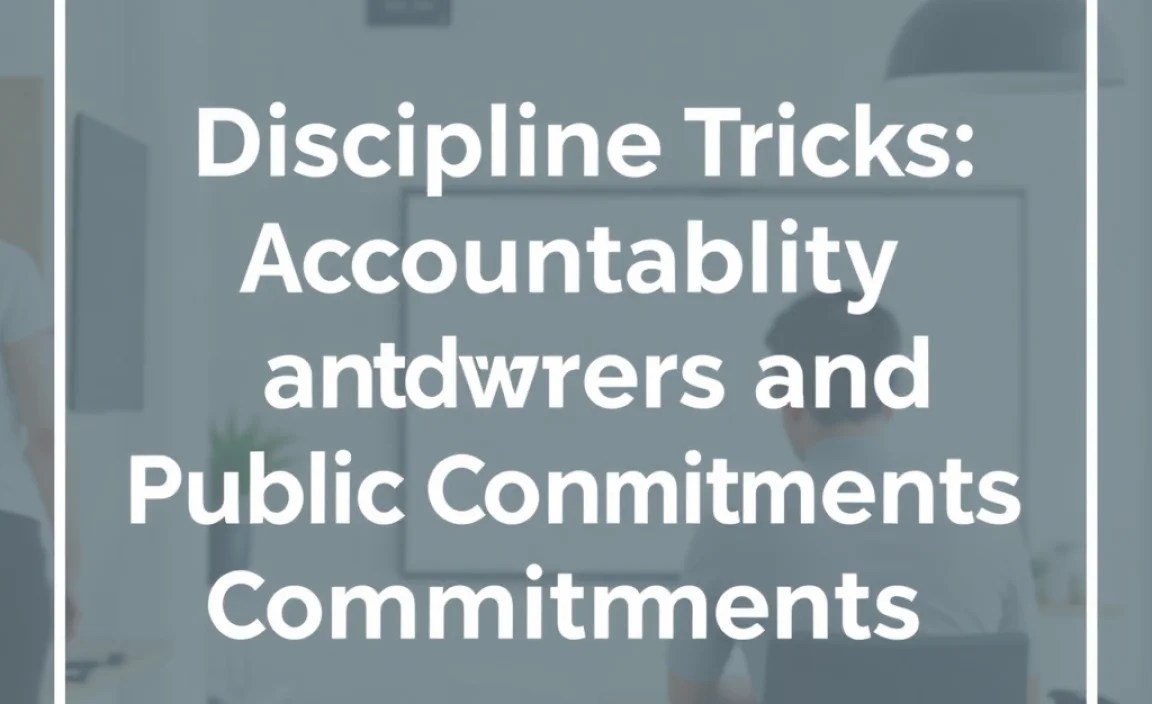Achieving goals and living a more fulfilling life often boils down to one fundamental skill: discipline. Yet, for many, the very word conjures images of arduous struggle, rigid self-denial, and overwhelming willpower. The good news is, it doesn’t have to be that way. The journey to becoming more disciplined can be surprisingly smooth when you employ the right “tricks discipline strategies.” These aren’t about Herculean feats of strength, but rather about clever, sustainable approaches that make sticking to your intentions feel less like a chore and more like a natural inclination.
The concept of discipline often gets muddled with punishment or deprivation. However, true discipline is about self-mastery, guiding your actions towards your desired outcomes. It’s about creating habits that serve you, rather than battling against your own impulses constantly. When you reframe discipline not as a burden, but as a set of empowering tools, the path forward becomes much clearer and infinitely more achievable. Let’s explore some of the most effective and surprisingly effortless tricks discipline strategies that can transform your approach to personal growth and productivity.
At A Glance
Leveraging the Power of Tiny Habits

One of the most profound yet simple “tricks discipline strategies” is the principle of making habits impossibly small. Think of it like this: instead of aiming to hit the gym for an hour every day, commit to doing just one push-up. Instead of aiming to read a whole book in a week, commit to reading just one page. The magic here lies in overcoming inertia. The hardest part of any task is often starting. By making the initial barrier so low, you bypass the mental resistance that often derails even the best intentions. Once you’ve completed the tiny habit, you often find yourself naturally wanting to do a little more. The one push-up might lead to five, and the one page might lead to a chapter. This gradual build-up, driven by positive momentum, is far more sustainable than trying to force yourself into massive, daunting changes.
Environment Design: Setting Yourself Up for Success

Another crucial element in implementing effective “tricks discipline strategies” is actively designing your environment to support your goals. This means removing temptations and making the desired action as easy and accessible as possible. If you want to eat healthier, for instance, don’t keep junk food in your pantry. Stock it with fruits, vegetables, and healthy snacks instead.
If you want to spend less time scrolling on social media, turn off notifications or even delete the apps from your phone during work hours. Conversely, if you want to exercise more, lay out your workout clothes the night before. Make your gym bag visible by the door. By subtly controlling your surroundings, you reduce the need for constant willpower and allow your environment to do some of the heavy lifting in guiding your behavior.
The Two-Minute Rule: Getting Over the Hump

Echoing the tiny habits principle, the “Two-Minute Rule” is a fantastic strategy for overcoming procrastination, a major hurdle for many when it comes to discipline. Popularized by productivity expert David Allen, this rule states that if a task takes less than two minutes to complete, you should do it immediately. This could be replying to a quick email, putting a dish in the dishwasher, or tidying a small area.
The beauty of this rule is that it prevents small tasks from accumulating and becoming overwhelming. It also creates a sense of accomplishment, which can fuel motivation for larger projects. By tackling these quick wins, you build momentum and reduce the mental load associated with unfinished business. This is a powerful, practical application of “tricks discipline strategies” that can have a significant impact on your daily productivity and sense of control.
Accountability Partners and Public Commitments

Holding yourself accountable is paramount, but sometimes, that internal drive needs a little external reinforcement. This is where accountability partners and public commitments shine as effective “tricks discipline strategies.” Sharing your goals with a friend, family member, or colleague who is also working on personal development can provide crucial support. Schedule regular check-ins to discuss progress, challenges, and celebrate wins.
Knowing that someone else is aware of your intentions can provide a powerful incentive to stay on track. Similarly, making a public commitment – whether it’s announcing your intention to a group, posting about it on social media, or even just writing it down in a visible planner – can create a sense of social pressure and commitment that nudges you towards action. The key is to choose someone or a platform that you trust and that will offer constructive support, not judgment.
Understanding Your “Why” and Visualizing Success

At the core of any sustainable behavior change lies a deep understanding of your motivations. When you’re implementing “tricks discipline strategies,” it’s essential to connect your actions to your underlying values and long-term vision. Ask yourself why you want to be more disciplined in a particular area. Is it for better health, career advancement, personal fulfillment, or something else entirely?
Once you’ve identified your “why,” make it a tangible part of your daily experience. Write it down, create a vision board, or simply take a moment each day to visualize yourself achieving your goals and experiencing the positive outcomes. This mental rehearsal can powerfully reinforce your commitment and make the effort involved in discipline feel more meaningful and less like a struggle against your natural inclinations.
Conclusion
The path to greater discipline doesn’t require a complete overhaul of your personality or an iron will of steel. By embracing these simple yet effective “tricks discipline strategies” – starting small, designing your environment, tackling tasks quickly, seeking accountability, and connecting with your deepest motivations – you can cultivate the habits and self-mastery needed to achieve your aspirations. These effortless strategies offer a sustainable and empowering approach to personal growth, proving that a more disciplined life is well within your reach.


